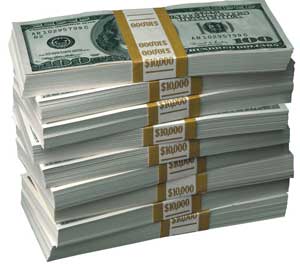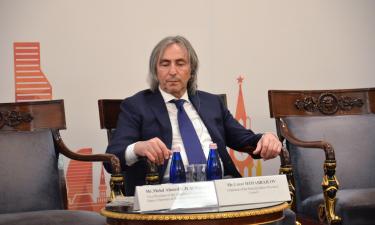Russia makes the largest-ever debt payment to Paris Club of Creditors
Russia will be able to save up to $6 billion in total before 2020 within the scope of the debt payment to the Paris Club
Russia and the Paris Club of Creditors signed an agreement about the prescheduled payment of one-third of Russia's debt. According to the signed document, Russia is to pay over $15 billion to the Paris Club within the upcoming three months. Aleksei Kudrin, the Russian Finance Minister, said that the first tranche would make up $13 billion. Germany will receive $6.5 billion of the sum, Kudrin said. 
The signed agreement marked the largest payment that Russia had ever made to serve its foreign debt. It is noteworthy that Russia's current debt payment became a unique occasion to the Paris Club as well.
Russia's debt to members of the Paris club of Creditors makes up $43.1 billion as of January 1,2005, which is the largest part of the nation's foreign debt. The average rate to serve the state debt of Russia makes up 7-13 percent. As a result, Russia pays off up to $7 billion a year, including $6 billion to Paris Club members.
The signing of the above-mentioned agreement about the prescheduled debt payment will let Russia save up to $6 billion on interest payments. The saving is to reach $350-370 million already this year, Sergei Storchak, a spokesman for the Russian Finance Ministry told RIA Novosti. The official reminded that the credit payment term expires in 2016-2020.
The Russian administration hurried to relieve the country of the debt burden as soon as high world prices on oil provided Russia with “excessive money.” Originally, Russia suggested the prescheduled debt clearance at the 10-percent discount. In other words, Russia asked a discount from Western countries to pay the debt ahead of the scheduled time.
Members of the Paris Club of Creditors, however, had a different approach to the matter. They believed that Russia was obliged to pay its debts fully and even pay a bonus to its creditors, taking into consideration the fact that three international rating agencies had raised the investment rating of Russia. It was particularly said that Germany, which remains Russia's main creditor, insisted on the 2,5-percent bonus to the face value of the debt.
Russian diplomats luckily managed to find a compromise, according to which Russia would pay the foreign debt fully without any discounts or bonus payments. Alexander Livshits, a former finance minister of Russia, said in an interview with the Echo of Moscow radio station that the agreement with the Paris Club became a true accomplishment of the Russian financial politics. Mr. Livshits believes that the solution of the debt problem will also ease the situation with Russia's Stabilization Fund.
As the squabble with the terms of the foreign debt payment continued, the question of using the money of Russia's Stabilization Fund became rather serious in Russia. About 75 billion rubles of the Fund are to be assigned for the correction of pension reform mistakes, according to the plan of the budget 2005. Over 100 billion rubles were supposed to be allocated to smooth out the consequences of the reform to eliminate state benefits in Russia. About 115 billion rubles are to be spent to raise pensions from March 1 of the current year.
Russia's Stabilization Fund is virtually the money-box of petrodollars, which currently saves 858 billion rubles. Such spending tempo can empty the box very quickly. Paying off the debt will save Russia from the growing inflation rate: when the money is wired abroad, it does not affect internal economic factors.
It is worth mentioning that the recent signing of the agreement with the Paris Club of Creditors might soon be followed with other documents too. “It is not ruled out that we will soon be able to offer new early payments to the Paris Club, depending on the development of the financial situation,” a spokesman for the Russian finance ministry told RIA Novosti news agency.
The money that Russia saves as a result of the debt payment to the Paris Club of Creditors could be used for social needs and investments, Finance Minister Aleksei Kudrin told reporters Friday. The minister reminded that the total volume of debt payment for 2005 was planned on the level of 244 billion rubles. The spending is equal to Russia's costs on education, culture and healthcare altogether. “It means that we are paying very high interests on the national debt,” Kudrin said.
According to the finance minister, Russia will be able to save $400 million in 2005 and almost $800 million in 2006. “The saving will make up about $600 million during the forthcoming years too,” Kudrin added.
Russia will be able to save up to $6 billion in total before 2020 within the scope of the debt payment to the Paris Club.
Subscribe to Pravda.Ru Telegram channel, Facebook, RSS!




